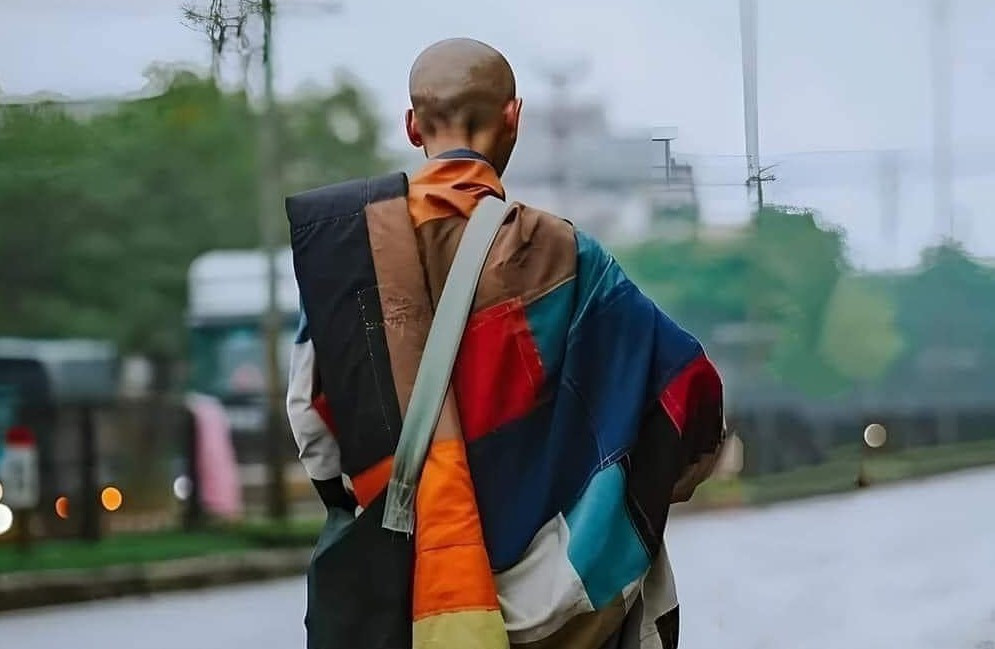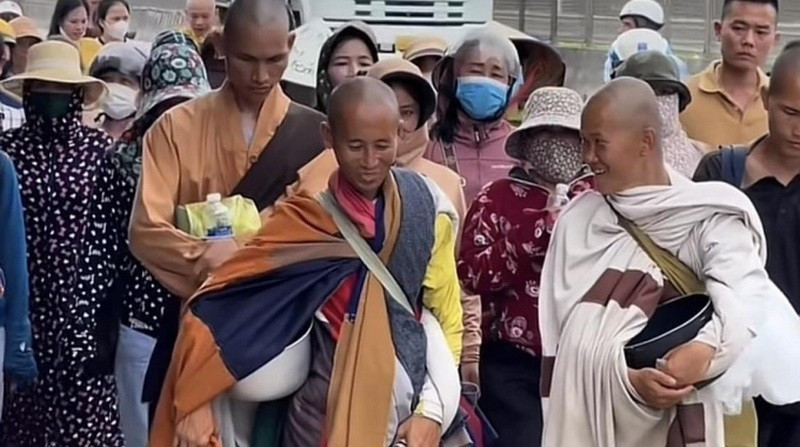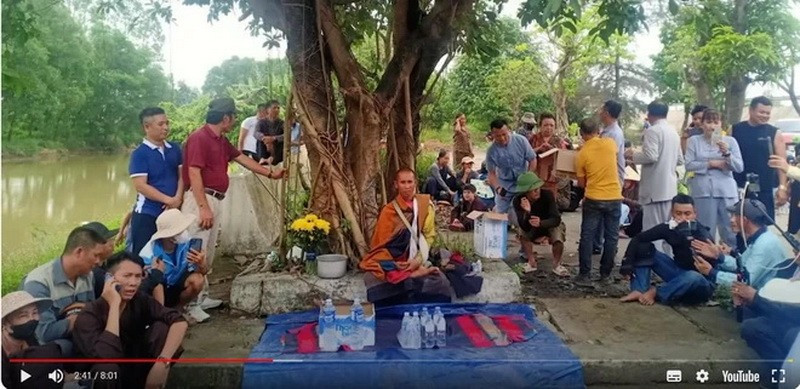Thich Minh Tue was only "self-cultivating" in the ascetic way but was blown up into an "internet phenomenon", and at the same time some hostile forces also took advantage to spread arguments that divide religions.

From an anonymous person who claimed to be "studying" the Buddha's teachings and walking bareheaded and barefoot from South to North, from North to South, Thich Minh Tue was blown up by youtubers, tiktokers, facebookers... into an "internet phenomenon."
What is the story behind this?
Thich Minh Tue is called "teacher" and "monk" on social media. However, Venerable Thich Duc Thien, Vice President and General Secretary of the Executive Council of the Vietnam Buddhist Sangha, affirmed on May 16: "Venerable Thich Minh Tue" is not a Buddhist monk, does not practice Buddhism, and is not a staff member of any pagoda or monastery of the Vietnam Buddhist Sangha.
“Monk Thich Minh Tue” is actually Mr. Le Anh Tu, 43 years old, originally from Ha Tinh province, residing in Ia Grai district, Gia Lai province, and used to be a land surveyor. This person also does not call himself a “teacher”, saying that he is “studying” according to the teachings of Buddha.
Actually, Thich Minh Tue is not doing anything too unusual. He is just practicing asceticism. Many monks are also practicing asceticism like that - wearing patched clothes, begging for food, eating one meal a day, sleeping under a tree or in an abandoned house or cemetery at night, not accepting offerings, refusing all comforts...
Thich Minh Tue has been practicing asceticism for 6 years and has walked from the South to the North and back 4 times. His previous “barefoot trips across Vietnam” did not cause any fuss.
This time, he himself said that he did not actively seek public attention. When someone asked to follow him to Ha Giang, he replied: "If you feel peaceful and happy, then go ahead. I neither invite nor chase anyone away."
In the Buddha's teachings, there are 84,000 methods of practice. Thich Minh Tue's choice to practice asceticism is his own right; others' choice to practice other methods is also their right.

To attract internet users for the purpose of selling, wanting to get attention or being influenced by some motive, some youtubers, tiktokers, and facebookers have exaggerated about Thich Minh Tue, stimulating people's curiosity, especially young people.
Following the crowd and the trend, many people intercepted the “walking monk,” following him for a long distance, pushing and shoving, fighting for a place to stand near him to take pictures and film… That chaotic scene was offensive and counterproductive to Thich Minh Tue’s own wishes.
Not missing the opportunity, some hostile forces have taken advantage of the "Thich Minh Tue phenomenon" to oppose the religious policies of our Party and State on social networks.
The first goal of the hostile forces is to divide religions from the Party and the State. They sow and exaggerate conflicts and disputes to assert that religion and the socialist regime in Vietnam cannot coexist; they confuse concepts by absolutizing the right to freedom of belief and religion without any constraints or sanctions; they fabricate that the Party, the State, and local authorities “discriminate against and oppress religions.”
If the crowd surrounding the “walking monk” causes chaos and the authorities have to intervene to ensure security, order, and traffic safety, hostile forces may spread the word “Police obstructing the monk from practicing his religion.”
The second purpose of hostile forces is to divide believers and non-believers, to divide religions from each other, to cause conflicts within each religion in order to weaken the great unity of the entire nation.
On social networks, there have appeared arguments causing conflicts between Buddhism and Catholicism, criticizing the Vietnam Buddhist Sangha, making unkind comparisons between "walking monks" and tens of thousands of monks and nuns "enjoying life in large temples with closed gates", considering asceticism as the true dharma, the only correct practice.
The third purpose is to promote and “heroize” social media phenomena in a way that is contrary to traditional values.
In the Thich Minh Tue phenomenon, besides the excessive enthusiasm of social networks, outside anti-government forces are trying to portray that this person "reminiscent of the image of Buddha in the past," spreading that nowadays Vietnamese people have begun to see the need to have "Buddha" in their hearts or in their homes.
Vietnam is among the 12 countries in the world and 6 countries in the Asia-Pacific region with a very high level of religious diversity.
This is not our Government's self-assessment but the result of a survey by the US-based Pew Research Center.
According to the Government Committee for Religious Affairs, our country has 26.5 million religious followers (accounting for 27% of the population).
Buddhism is the largest religion, with more than 14 million followers and 18,544 temples with nearly 55,000 monks and nuns practicing. Catholicism ranks second with more than 7 million followers and 7,771 places of worship.
Protestantism and Caodaism rank third and fourth in terms of number of followers. All religions are equal before the law and people are free to choose their religion, to believe or not to believe.
In 2003, our State recognized 6 religions with 15 organizations, 17 million followers, about 20,000 places of worship; 34,000 dignitaries, 78,000 officials. By 2022, our State will recognize 16 religions with 43 organizations, 26.5 million followers, more than 53,000 dignitaries, about 135,000 officials; more than 29,000 places of worship.

Of the 16 religions officially recognized by the State, 9 religions were imported into Vietnam from abroad (Buddhism, Catholicism, Protestantism, Brahmanism, Islam, etc.)
The State guarantees and creates conditions for religious organizations to establish religious training facilities and open religious training courses. There are currently 62 religious training facilities in the country in localities.
Vietnamese law protects religious freedom but also strictly deals with acts of taking advantage of religion.
Article 24 of the 2013 Constitution of Vietnam stipulates: "Everyone has the right to freedom of belief and religion, to follow or not to follow any religion. Religions are equal before the law. The State respects and protects the right to freedom of belief and religion. No one may violate the freedom of belief and religion or take advantage of belief and religion to violate the law."
Article 6 of the 2016 Law on Belief and Religion stipulates prohibited acts: "Infringing upon national defense, security, national sovereignty, social order and safety, and the environment; harming social morality; infringing upon the body, health, life, and property; insulting the honor and dignity of others; Obstructing the exercise of citizens' rights and obligations; Dividing the nation; dividing religions; dividing people who follow beliefs and religions from people who do not follow beliefs and religions, and between people who follow different beliefs and religions; Taking advantage of belief and religious activities for personal gain."
These days, Buddhists across the country are also joyfully celebrating the annual Buddha's birthday. This is one of the proofs that our Party and State always ensure to apply the provisions of the law on freedom of religion and belief into real life, meeting the needs of the people.
That also means that violations of the law on religion and belief will also have to be strictly handled.
University (according to Vietnam+)